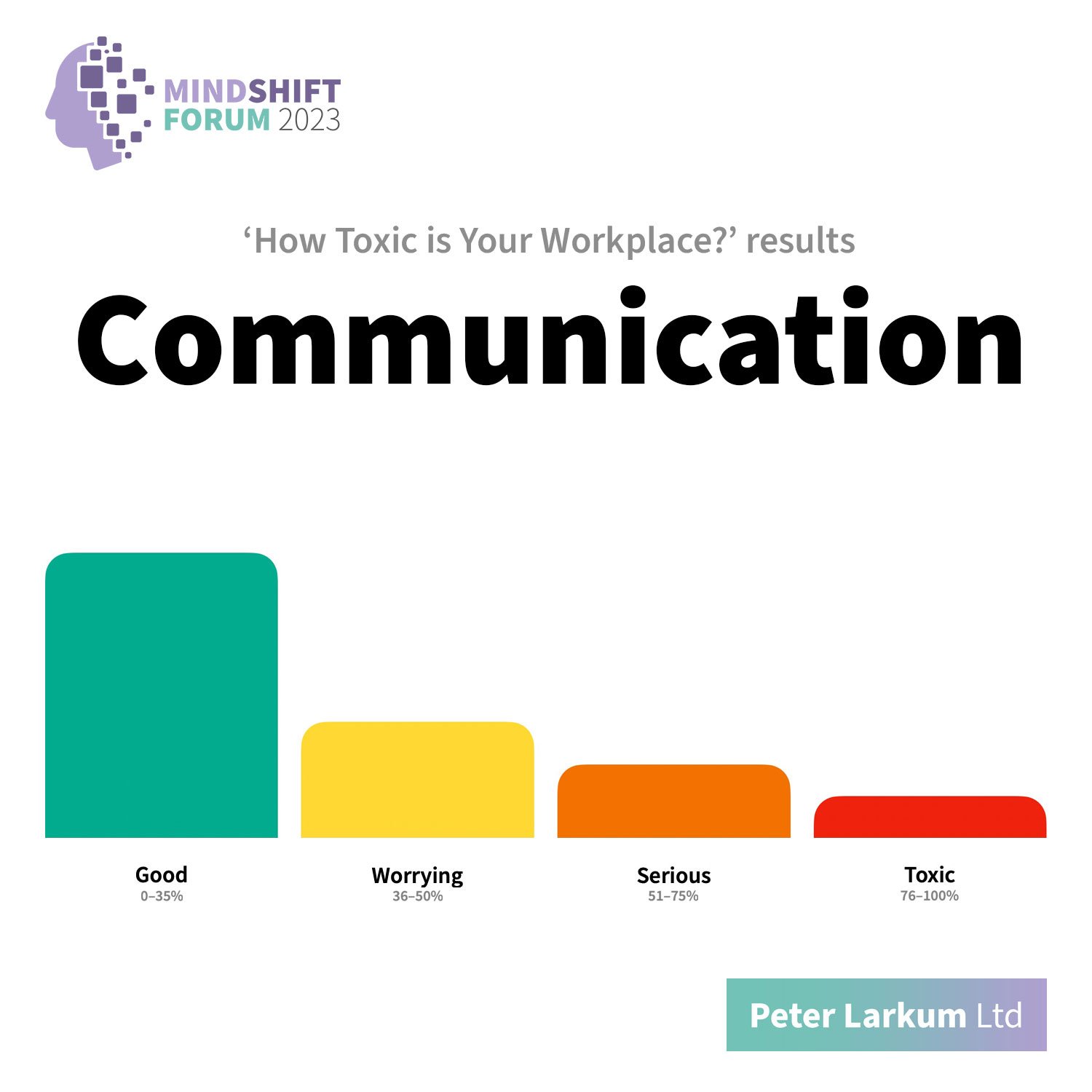Results: Toxic Workplace quiz
This year for Mind Shift Forum, we’re exploring ‘Culture Shift’ — how to identify toxic work culture and learn to lead a healthier teams.
In January, we kicked that off with a daunting quiz: “How Toxic is Your Workplace?” This was an absolutely fascinating survey to conduct. Thank you to everyone who took part.
One person (who I’ll keep anonymous) wrote to me and said:
“I took your quiz and I think the results were un-charitable!! 😂 (actually that's not funny.) I’m at a crossroads in my career and truly fed up with working in environments where late night emails and working through leave is celebrated and expected.”
The 16 questions of the quiz were broken down into 4 different categories:
Workload
Management
Co-workers
Communication
Here are the results…
The healthiest category: Co-Workers
The healthiest category was co-workers. 42% of respondents had good results. Thankfully, only 2% of results scored as toxic, which was the lowest toxic result of all the categories. Out of all the categories, it had the healthiest average score of 36% (lower is better).
However, worrying (33%) and serious (22%) results were present in the mix too — meaning there is still much work to be done in improving our relationships with our co-workers.
We were looking to see if environments fostered a sense of competition between co-workers rather than collaboration. In competitive environments, co-workers take credit for other’s achievements. In clique work environments, there are obvious in-groups which means many people don’t feel like they fit in or belong there.
The most toxic category: Workload
The worst category? Workload.
We wanted to know if there was a culture of hustle and crunch, where working more than normal hours was encouraged and where work continually ate into time off. Unsurprisingly, yes it did.
47% of the submissions (5 out of 10 people) were in the serious category or worse.
With a 55% average score (higher is worse), most people are overworked and putting in too many hours. A shockingly low 22% of the results were good (the lowest of any category) with 14% of them being toxic (the highest of any category).
Management
According to our results, 20% of leaders (2 in 10) never admit they are wrong or accept responsibility for mistakes. A further 18% rarely do so. Which is just terrifying.
Add to that, 40% of leaders (4 in 10) are more than happy to virtue signal (meaning they say they care about certain topical issues without doing much of anything to really help). This result in particular shows why shifting work culture matters: Empty words are not enough. We need action.
We devoted the bulk of our quiz questions here because we truly believe management creates the culture. We were looking to see if there was micromanagement, favouritism, lack of training, or bullying from managers to get to our result.
Our average overall score for management was 41% (lower is better) with 42% of results being good and 12% being toxic.
Communication
Communication was a largely positive result with over 55% of the results being good. 8% of communication results were toxic. And the average overall score was 37% (lower is better). However, there is still much room for improvement.
We wanted to know if it was okay to talk about mental health or express feedback without fear of being reprimanded. Were management simply looking for “yes sir” or “yes ma’am,” or did they value your insight as part of the conversation?
Overall aggregate results
Only 40% of submissions (4 in 10) did not cross into any serious or toxic territory in any category. And only 8% of submissions (1 in 10) were good across the board.
Overall, 28% of submissions (3 out of 10) are working in serious or worse workplaces, where the most worst issues are in the categories of workload and management.
Get shift done.
Part of shifting work culture towards the good means we learn to…
identify toxic behaviours
lead strategic changes to disempower the bad and incentivise the good
That’s what the ‘Culture Shift’ year is all about.
If you join Mind Shift Forum (it’s free), you’ll receive a monthly ‘Culture Shift’ email to help do that. We’re having a conversation about leadership, mental health, and what we need to do to improve the work culture in the UK.




